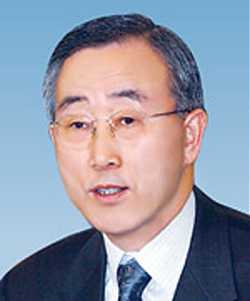 Three European countries are mounting a campaign for two available seats on the U.N. Human Rights Council, even as the prestige of the Geneva-based body reaches a new low. France, Britain, and Spain are lobbying the 192 U.N. member states, seeking to gain support for their claim to two available slots among the seven that are reserved for Western countries on the 47-member council. America has declined to run for membership on the council, which in the two years since its inception has faulted only Israel for human rights violations.
Three European countries are mounting a campaign for two available seats on the U.N. Human Rights Council, even as the prestige of the Geneva-based body reaches a new low. France, Britain, and Spain are lobbying the 192 U.N. member states, seeking to gain support for their claim to two available slots among the seven that are reserved for Western countries on the 47-member council. America has declined to run for membership on the council, which in the two years since its inception has faulted only Israel for human rights violations.The council committee in charge of organizing a follow-up to a 2001 conference on racism, known as Durban II, suffered a new setback this week when African countries reportedly decided not to host the parley. The first indication that South Africa would not host the conference which is named for Durban, the South African city that was home to the first parley emerged two weeks ago, when President Mbeki said "no decision" had been made on the conference's venue. Diplomats now are saying that next year's conference is likely to take place in Vienna or Bangkok.
In an indication that Durban II would see a repeat of the anti-Semitic overtones that plagued the first conference, the Canadian Council for Israel and Jewish Advocacy this week withdrew its application to the organizing committee for credentials as a nongovernmental organization. One member of the committee, Iran, set up a series of obstacles to the Canadian NGO's application "for no apparent reason other than the inclusion in its name of the words Jewish and Israel," the executive director of U.N. Watch, Hillel Neuer, said.
Canada has already said it will skip Durban II, and Israel and America are expected to follow suit. But the European Union has yet to decide on participation, the French ambassador for human rights, François Zimeray, told reporters yesterday in New York, where he was visiting to lobby for a seat on the Human Rights Council. A British Foreign Office minister and former deputy U.N. secretary-general, Mark Malloch Brown, recently visited several countries, including China, and lobbied U.N. member states in New York in an attempt to gain one of the two council seats.
The "Western European and Others" council bloc includes America, Canada, Australia, and Israel. Spain has mounted a similar campaign, as has France. "France and human rights is an old couple," Mr. Zimeray said yesterday. Mr. Zimeray described the first Durban conference as a "laboratory of hatred" and said it would have become the most significant event in international "political life" had it not been immediately followed by the attacks of September 11, 2001. Durban II risks the same fate, he said, and he acknowledged that the Human Rights Council "is not perfect." Asked why France should lend its prestige to a body that he said has an "obsession" with Israel, Mr. Zimeray said that if Western countries withdrew from the Human Rights Council and established a separate rights panel, they would create a situation like that in ancient Greece, where democracy was reserved for Athenians only.

 Foreign Minister Bernard Kouchner of France said Tuesday that the European Union should consider punishing China's crackdown in Tibet with a boycott of the opening ceremony of this summer's Olympic Games in Beijing. His comments followed an appeal by the press advocacy group Reporters Without Borders to governments across the world to shun the highly symbolic ceremony during which the Olympic flame is lighted.
Foreign Minister Bernard Kouchner of France said Tuesday that the European Union should consider punishing China's crackdown in Tibet with a boycott of the opening ceremony of this summer's Olympic Games in Beijing. His comments followed an appeal by the press advocacy group Reporters Without Borders to governments across the world to shun the highly symbolic ceremony during which the Olympic flame is lighted. America needs to work hard to regain the trust of the British public following the Iraq war and the Bush years, a senior adviser to Barack Obama says today.
America needs to work hard to regain the trust of the British public following the Iraq war and the Bush years, a senior adviser to Barack Obama says today. NEW YORK New Secretary-General Ban Ki-moon on Wednesday announced his picks for two of the top posts at the United Nations this week and one of those choices is controversial.
NEW YORK New Secretary-General Ban Ki-moon on Wednesday announced his picks for two of the top posts at the United Nations this week and one of those choices is controversial.